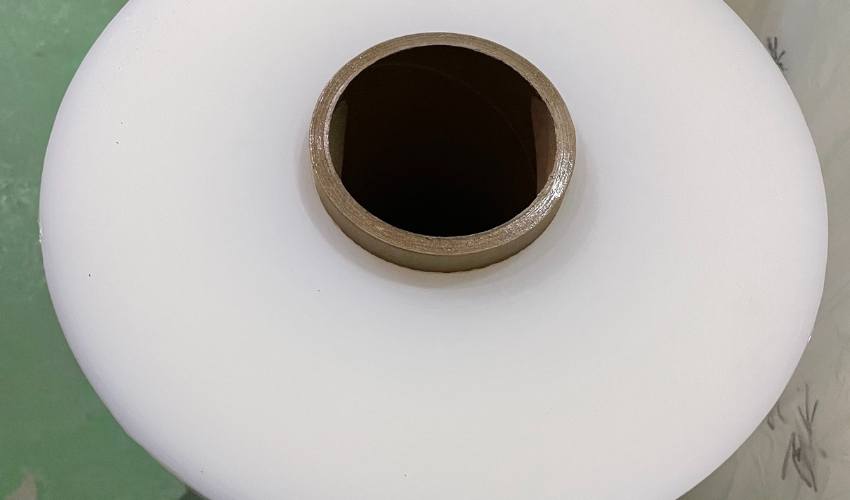
Stretch film is a versatile and widely used packaging material known for its ability to secure and protect products during storage and transportation. It is made from polyethylene and stretches to fit various shapes and sizes, offering both flexibility and durability. One specialized type of stretch film is the anti-corrosive stretch film, which is designed specifically to protect metal products from rust and corrosion. By incorporating corrosion inhibitors, this film creates a protective barrier around the metal surfaces, preventing moisture and contaminants from causing damage. Anti-corrosive stretch film is essential for industries dealing with steel, automotive parts, and other metals, ensuring that products maintain their quality and performance throughout their journey.
Anti-corrosive stretch film is a specialized form of stretch film that incorporates volatile corrosion inhibitors (VCIs) into its material composition to protect metal surfaces from corrosion during transportation and storage. Typically made from polyethylene, this stretch film is designed to be both strong and stretchable, providing a tight, secure wrap around products. However, what sets anti-corrosive stretch film apart from regular stretch film is the inclusion of corrosion inhibitors that actively prevent the formation of rust on metals such as steel, iron, and other alloys. These inhibitors are released slowly from the film to form a protective layer on the surface of the metal, ensuring that it remains free from oxidation.
These differences make anti-corrosive stretch film an essential solution for businesses that need to protect metal products during storage, shipment, or handling.
Anti-corrosive stretch film offers an advanced solution for protecting metal products from rust and corrosion during storage and transportation. Unlike regular stretch film, which primarily provides a physical barrier against dust and dirt, anti-corrosive stretch film integrates specialized corrosion inhibitors into its structure. These inhibitors actively work to protect metal surfaces from moisture and other environmental factors that cause oxidation and rust.
The primary function of anti-corrosive stretch film is to prevent rust and corrosion on metal products. This is achieved through the following mechanisms:
VCIs play a critical role in how anti-corrosive stretch film works. These inhibitors are chemicals that volatilize from the film and form a thin, protective layer on the surface of metals, offering active corrosion prevention. The VCIs work by neutralizing the corrosive effects of moisture and other environmental factors, such as salt or chemicals, that typically lead to rusting.
When applied to metal products, anti-corrosive stretch film tightly wraps around the item, creating a barrier that seals out contaminants. As the film clings firmly to the uneven surfaces of the metal, it ensures full coverage, preventing any exposure to the elements that might cause rust.
By creating a continuous protective shield and incorporating VCIs, anti-corrosive stretch film ensures that metal products remain free from corrosion, even in challenging environmental conditions.
Anti-corrosive stretch film provides a wide range of advantages for businesses that need to protect metal products from the damaging effects of corrosion. This film is not only effective in preventing rust and oxidation, but it also offers several other benefits that can enhance the efficiency and cost-effectiveness of the packaging process.
These benefits make anti-corrosive stretch film an essential tool for industries that handle metal products, ensuring that these items are protected from rust and other forms of corrosion while also offering practical advantages in terms of cost, efficiency, and ease of use.
Anti-corrosive stretch film is widely used in industries that handle metal products, offering an effective way to protect against rust and other forms of corrosion during storage, transportation, and handling. The stretch film’s uses extend to a variety of metal items, including steel coils and automotive parts, providing an additional layer of protection against environmental factors. The versatility and protective properties of this film make it ideal for a range of applications, ensuring that the integrity of products is maintained throughout the supply chain
Anti-corrosive stretch film is particularly effective for protecting metal products that are vulnerable to corrosion during their transit or storage period. Common applications include:
Several industries rely on anti-corrosive stretch film for packaging metal products, as it offers specific protection against corrosion and environmental factors. Key industries that benefit from this film include:
Anti-corrosive stretch film is adaptable to different packaging methods, ensuring that businesses can use it in a variety of scenarios, whether they are wrapping individual items manually or using automated machines.
By offering flexible packaging solutions for both manual and automated processes, anti-corrosive stretch film ensures a streamlined, efficient, and effective method for protecting metal products across industries.
Applying anti-corrosive stretch film properly ensures that metal products are fully protected from rust and corrosion. Whether you are using it manually or with an automated system, the key to effective application lies in careful attention to the wrapping process. Below is a detailed guide on how to apply anti-corrosive stretch film to achieve maximum protection.
To ensure proper protection, follow these steps when applying anti-corrosive stretch film:
For optimal results, keep these tips in mind while applying anti-corrosive stretch film:
The method of applying anti-corrosive stretch film can vary depending on whether you’re using manual or machine wrapping.
By following these steps and tips, you can effectively apply anti-corrosive stretch film to protect metal products from corrosion and rust, ensuring they remain in top condition during storage and transportation. Whether done manually or by machine, the goal is to ensure complete coverage and secure the film in place for maximum protection.
Selecting the right manufacturer for anti-corrosive stretch film is crucial to ensuring that the products you receive meet the required standards for quality, durability, and performance. A reliable supplier can provide the necessary expertise, product consistency, and customer support to help protect your metal goods from corrosion and rust. Below are some important factors to consider when choosing the right supplier for anti-corrosive stretch film.
When sourcing anti-corrosive stretch film, there are several key elements to evaluate in a manufacturer:
Choosing a manufacturer with the right experience and expertise is vital. Here are some factors to look at in more detail:
When selecting an anti-corrosive stretch film manufacturer, it’s important to ensure that they offer the following features:
By choosing a manufacturer who meets these criteria, you can ensure that you’re getting high-quality anti-corrosive stretch film that provides maximum protection for your metal products. A trusted manufacturer will deliver consistent, effective, and cost-efficient solutions that align with your packaging requirements.
The price of anti-corrosive stretch film is influenced by various factors, including material quality, quantity, thickness, and the supplier’s pricing structure. Understanding these elements can help businesses make informed purchasing decisions and optimize their investment in stretch film for packaging metal products.
Several factors determine the cost of anti-corrosive stretch film, including:
When shopping for anti-corrosive stretch film, it’s essential to compare prices from anti-corrosive stretch film exporter. Prices can vary significantly depending on the supplier’s manufacturing capabilities, location, and reputation. Here are a few steps to ensure that you’re getting the best deal:
To maximize your investment in anti-corrosive stretch film factory, consider the following strategies:
By understanding the factors that affect the cost of anti-corrosive stretch film and comparing prices across suppliers, you can make an informed decision that balances both quality and cost, ensuring the best value for your investment.
When purchasing anti-corrosive stretch film, getting accurate pricing is essential for budgeting and ensuring that you are receiving fair value for the product. The process of obtaining a quote involves understanding your specific needs and communicating them clearly to suppliers.
To obtain a precise quote for anti-corrosive stretch film, follow these steps:
When requesting a quote for anti-corrosive stretch film, you’ll need to provide the following information to help the supplier give you an accurate price:
Several factors can affect the pricing of anti-corrosive stretch film. Being aware of these elements helps in understanding why quotes may vary between suppliers:
By clearly communicating your needs and understanding the factors that influence pricing, you can obtain an accurate quote for anti-corrosive stretch film that fits your budget and application requirements.
Selecting the right anti-corrosive stretch film is essential for ensuring the effective protection of metal products during storage and transportation. Several factors come into play when making this decision, and understanding these will help you choose a product that best suits your needs.
When choosing anti-corrosive stretch film, consider the following key factors to ensure you get the best protection and performance:
When looking for a supplier or manufacturer of anti-corrosive stretch film, consider the following criteria to ensure you are choosing a reliable and high-quality provider:
By considering these factors, you can confidently choose the right anti-corrosive stretch film for your needs and ensure your metal products are protected throughout their journey.
Anti-corrosive stretch film is a specialized type of stretch film designed to protect metal products from corrosion during storage and transportation. This film is infused with Volatile Corrosion Inhibitors (VCI) that emit protective vapors, creating a barrier against moisture, dirt, and other environmental elements that can cause rust and degradation. The film’s stretchability allows it to conform tightly around metal objects, ensuring complete coverage and reliable protection. By creating a protective environment, anti-corrosive stretch film helps extend the life of metal products, reducing the need for costly reconditioning or replacement due to corrosion.
The film works by adhering to the surface of the metal and releasing corrosion inhibitors that form a protective layer, safeguarding metals such as steel, aluminum, and iron from rust and deterioration. This process is highly effective in preventing corrosion even in challenging storage conditions or during long-distance transportation.
There are several key advantages to using anti-corrosive stretch film instead of regular stretch film, especially for industries dealing with metal products:
Corrosion Prevention: Anti-corrosive stretch film contains VCI technology that actively prevents corrosion, unlike regular stretch film, which offers no protection against rust and deterioration.
Increased Durability: The protective properties of anti-corrosive stretch film help to preserve the integrity of metal products for longer periods, even in harsh environmental conditions.
Cost-Effective Protection: By preventing corrosion, this film reduces the need for expensive anti-corrosion treatments or repair costs, saving businesses money in the long run.
Ease of Application: Anti-corrosive stretch film is just as easy to apply as regular stretch film and can be used in both manual and automatic packaging systems, offering a simple solution for corrosion protection.
These benefits make anti-corrosive stretch film an ideal choice for industries like manufacturing, automotive, and construction, where metal components need extra protection against rust and other environmental hazards.

My name is James Thompson, and I’m the editor of this website dedicated to Stretch Film, Pallet Wrap, and Stretch Wrap products.
My passion for packaging began when I noticed the challenges companies face in securing their products efficiently for transportation and storage. This inspired me to delve deep into the world of stretch films and pallet wraps, exploring the latest technologies and best practices.
I aim to provide valuable insights, practical tips, and up-to-date industry trends to assist you in making informed decisions. Whether you’re a small business owner or part of a large corporation, my goal is to support you in optimizing your operations and ensuring your products reach their destination safely.
Thank you for visiting, and I look forward to accompanying you on your journey toward better packaging solutions.
Comments are closed